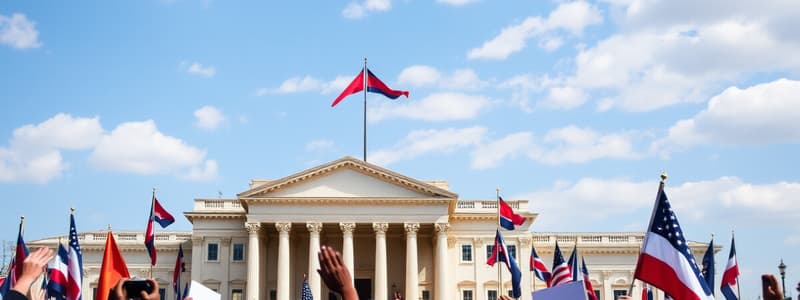Podcast
Questions and Answers
Which government system is characterized by a lack of separation between religion and state?
Which government system is characterized by a lack of separation between religion and state?
- Theocracy (correct)
- Constitutional monarchy
- Federalism
- Secularism
What is a key characteristic of a parliamentary democracy?
What is a key characteristic of a parliamentary democracy?
- The president is the head of state
- The judiciary has the most power
- The head of state is not involved in the legislative process
- The legislature elects the prime minister (correct)
Which country is known for having a parliamentary democracy?
Which country is known for having a parliamentary democracy?
- Germany (correct)
- Saudi Arabia
- China
- United States
In a mixed economy, what role does the government play?
In a mixed economy, what role does the government play?
What is the primary role of the judiciary in a democracy?
What is the primary role of the judiciary in a democracy?
Which form of government do citizens have direct involvement in decision-making?
Which form of government do citizens have direct involvement in decision-making?
Which system of government often features a single-party system?
Which system of government often features a single-party system?
Which government system is characterized by a leader who comes to power through force or violence?
Which government system is characterized by a leader who comes to power through force or violence?
What is a democracy?
What is a democracy?
Which of the following is an example of a direct democracy?
Which of the following is an example of a direct democracy?
In a republic, how is the head of state chosen?
In a republic, how is the head of state chosen?
What distinguishes a constitutional monarchy from an absolute monarchy?
What distinguishes a constitutional monarchy from an absolute monarchy?
Which of the following countries has an absolute monarchy?
Which of the following countries has an absolute monarchy?
What is an oligarchy?
What is an oligarchy?
What is the key feature of a theocracy?
What is the key feature of a theocracy?
What is the primary difference between a federal and a unitary government system?
What is the primary difference between a federal and a unitary government system?
Flashcards are hidden until you start studying
Study Notes
Forms of Government
- Democracy: Power is vested in the people, allowing for participation in decision-making.
- Direct Democracy: Citizens directly vote on laws and policies; Switzerland is a notable example.
- Republic: The head of state is chosen through elections, contrasting with hereditary systems.
- Constitutional Monarchy: Monarch shares power with a constitutionally organized government; differs from absolute monarchy where the monarch holds total power.
- Absolute Monarchy: A government led by a monarch with unrestricted power, as seen in Saudi Arabia.
Political Systems
- Oligarchy: Power is concentrated among a small group, sharing governance rather than a single ruler.
- Autocracy: Characterized by a leader wielding near-total control over the state.
- Theocracy: Government led by religious figures, with laws often based on spiritual beliefs; Iran is a contemporary example.
Government Control and Structure
- Totalitarian Regime: Extensively controls nearly all aspects of life, including personal freedoms.
- Federal vs. Unitary Systems: Federal systems distribute power between central and regional governments, while unitary systems centralize power.
Governance Characteristics
- Parliamentary Democracy: Prime minister is elected by the legislature; does not involve the head of state in legislative processes.
- Mixed Economy: Combines free market principles with government regulation; prevents total control of resources.
Political Functions
- Judiciary Role: Interprets laws in a democracy, ensuring laws align with the constitution.
- Political Parties: Serve to influence and organize public opinion, shaping government policies and decisions.
Citizen Participation
- Direct Involvement in Government: Direct democracy allows citizens to vote on every issue, contrasting with representative forms where elected officials make decisions.
- Single-Party Systems: Often found in totalitarian regimes, limiting political diversity and citizen participation.
Head of State and Governance
- Presidential System: The president typically serves as both head of government and head of state.
- Lifelong Power: Absolute monarchs often hold power for life, unlike elected heads in democratic systems.
Summary of Key Countries
- Examples of Government Types:
- Absolute Monarchy: Saudi Arabia
- Parliamentary Democracy: Germany
- Federal Government: United States
- Theocracy: Iran
Studying That Suits You
Use AI to generate personalized quizzes and flashcards to suit your learning preferences.




